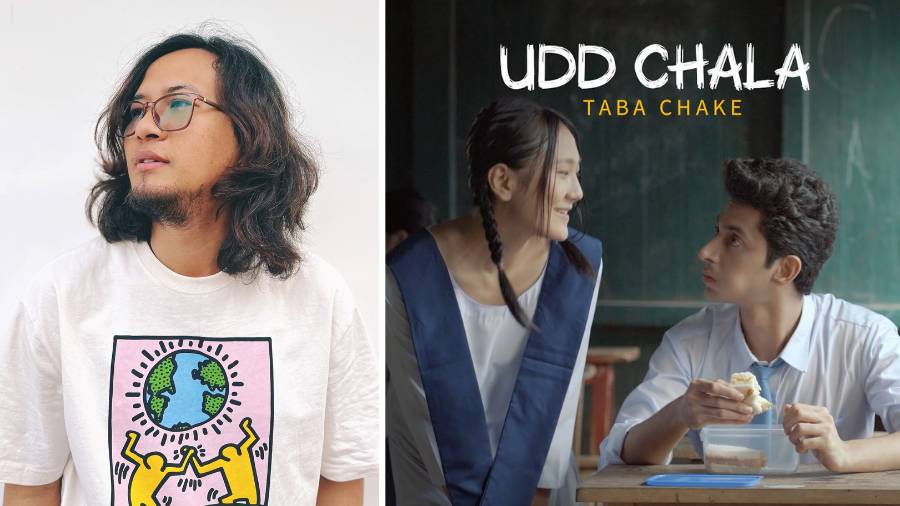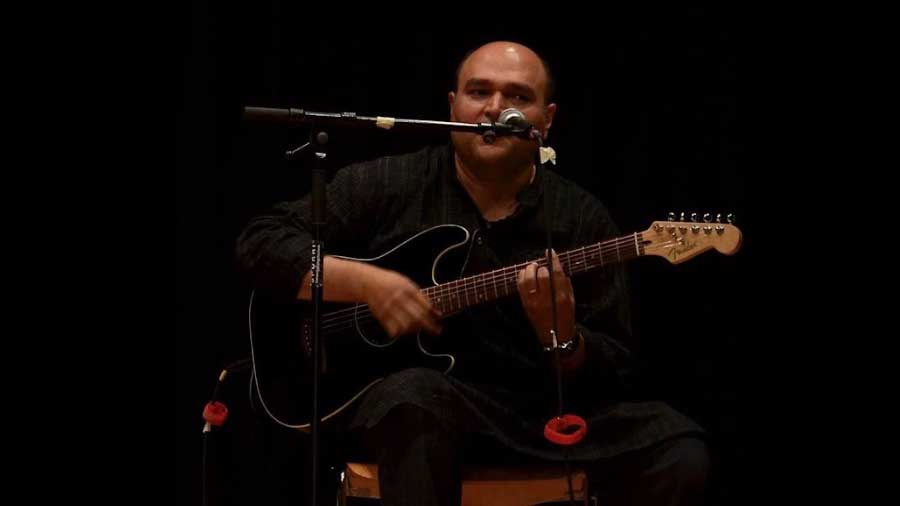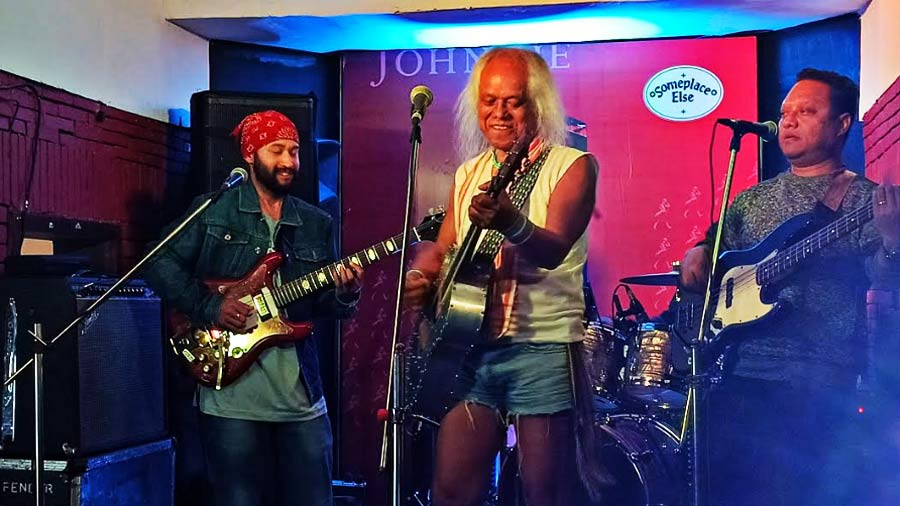His songs will remind you of the hustle-bustle of a metropolis and the tranquillity of nature, sometimes in the same track. Taba Chake took the country by storm in 2019 with his trilingual album, Bombay Dreams, which explored his experience of moving to the big city with songs in English, Hindi and his native Nyishi. The musician from Arunachal Pradesh has since gained a listenership of over 12 million across platforms and is one of the most loved independent artistes in the country.
My Kolkata caught up with the artiste — who is riding high on the release of his new single, Udd Chala, which already has over 400,000 streams on YouTube — to talk about what drives his music.
My Kolkata: Which artistes did you grow up listening to? Who are your favourite artistes?
Taba Chake: I grew up listening to a lot of metal and hard rock, especially technical metal, death metal and progressive rock. There were a lot of Pakistani bands, jazz and of course Bollywood — I used to listen to a bit of everything actually. As for now, I am in a phase where I don't really care about the artiste’s name, I just keep scrolling through songs and try to understand the melody and musicality. If you listen to my music, you’ll see that it's a mix of everything too. For example, In Waadiyon Mein (from Bombay Dreams), has a little bit of technical rock and Meri Dastaan (from Bombay Dreams) is more mellow with elements of progressive rock, while Walk With Me (from Bombay Dreams) is more pop!
So how do you discover new music now?
To be honest, I have all the apps on my phone. When I’m listening to one app too much, I switch to another to get custom recommendations from it. I’m driven less by artistes and more by genre, so I’ll look for music depending on whether I’m in the mood for pop, rock, jazz or metal. Actually, my younger brother helps me a lot with this, he keeps sending me songs saying, “Chake bhaiya yeh suno, ye naya gaana hai, yeh abhi ke genre aur artistes hai! (Chake bhaiya, listen to this new song. These are the recent artists and genres!)”
What's the musical culture like in Arunachal Pradesh, where you grew up?
Funnily enough, the music scene in the Northeast is quite different from the music I make. We are very much into Bollywood, in fact! If you go to any party or music festival, someone will be playing Bollywood and dancing to it. Then again, there are groups of people who are experimental when it comes to genres. We also have a rich traditional culture with our own folk sounds. That way, musicians like me, who want to try and test every genre, get a lot of inspiration since we are exposed to a mix of everything.
As a multilingual artiste, how do you preserve the individuality of each language? Are you a different musician while creating in English, Hindi and Nyishi?
At some level, yes, because English and Hindi can be considered more ‘universal’ so there is a huge music scene for it and it’s not as difficult to write something in those languages. For Nyishi or Assamese, there is a much smaller community, as fewer people speak it. So, while writing, I have to put in that extra effort and channel the folk artiste in me and imagine myself in the environment to pair the right word with the right emotion. I try to make it sound universal, but writing in Nyishi or Assamese is quite different from writing in English or Hindi, and you need to think from the inside.
Your music speaks about the bustle of city life in Mumbai while also talking about your quiet hometown. How do you strike a balance between them?
I spent my whole life in Arunachal Pradesh, so that experience is already inside me. I don't need to seek it elsewhere. As an artiste, I never imagined that I would get a chance to move outside that life. All of us are deeply connected to Bollywood and when we talk about the music industry, it is automatically associated with Mumbai. The first time I landed there, the big buildings intimidated me. I kept thinking, “How will I write music or make a mark in such a big place?” We have huge mountains in Arunachal, but Mumbai has these big buildings with thousands of people in each of them, and five people living in a room. It was a difficult journey, but after moving there, I got to experience a new world. This shift to a new lifestyle automatically brought balance. That’s actually how Meri Dastaan came out. I wanted to write about my entire journey, while not forgetting my past, so that I could keep moving forward.
Indie artistes have been making a space for themselves in the industry in the last few years with the advent of streaming. What is your take on making your mark independently vs signing for a label?
To be honest, I don't know how to answer this. It depends on the person. Musicians are very emotional about their songs and they don’t want to give away control to a label. But since it's such a large country, some of them do give it to a label for release, since it will reach more people and that’s another dream. I personally believe that if you have music that shows your emotions, you don’t necessarily have to sign with anyone. All that matters is how you see it. I believe that when you leave this world, there is just peace; so it’s important to share your music with the world, right?
How has life changed between Bond with Nature (his first album, which released in 2016) and Bombay Dreams?
Ummm… life toh same hi hai, nothing has changed in particular (laughs). I'm still the same old funny guy. Just the number of listeners has changed. But, as a person and artiste, I haven’t. The response has been great.
What is your favourite fan response so far?
I remember this particular interaction after a gig at Guwahati in 2021. A guy came to me after my show, crying, and said, “Taba, your songs really helped me during my worst time. I wanted to kill myself and your music saved me. Thank you for creating your songs.” He was my age, and said it from his heart while crying. I didn’t know what to say, but that was a really emotional moment for me.
Your new single, Udd Chala deals with the uncertainties of the pandemic. How did the period impact you as a person and a musician?
Firstly, I’m thankful that we are here and talking right now. I thought the pandemic was the end of the world. But that’s the thing — you never know. The world could end any second, and we could vanish. The years 2020 and ’21 really changed my perspective on life. It made me realise that we keep so many things inside, and don’t say them openly. Now, if I like something or want to send a heartfelt message to someone, I just say it without waiting for tomorrow. Now, I want to write more positive songs. There is an album coming with a bunch of new songs. Udd Chala came from a similar space where I was thinking about school-time love and puraane din (old days), and it made me very nostalgic. I wanted to write down all the feelings I had in school, but was too nervous to explore back then, be it a crush or the desire to talk to someone. I explored this love-at-first-sight, which can’t be expressed, but leads to you imagining and dreaming about a future with them. The video perfectly complemented what I wanted to say.
How has your experience been performing in Kolkata?
I have done just one show in Kolkata and it was great. I particularly remember the food. It was a small venue with a capacity of less than 500, and quite intimate. I’m waiting for more festivals to call us to perform there!


